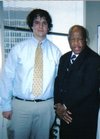David Gushee & Path to Discernment on Homosexuality
Baptist ethicist and Associated Baptist Press editorial-writer David Gushee recently put out his third article in the past four months on homosexuality.
Gushee's first article was appropriately titled "On homosexuality, can we at least talk about it?"
Gushee stated his purpose for this series up front:
...to begin a dialogue in this column by simply calling for the rudiments of Christian love of neighbor to extend to the homosexual. And the place to begin is in the church -- that community of faith in which we have (reportedly) affirmed that Jesus Christ is Lord.
Gushee called for the following Christian commitments:
- -- The complete rejection of still-common forms of speech in which anti-homosexual slurs (“queer,” “fag”) are employed either in jest or in all seriousness
- -- The complete rejection of a heart attitude of hatred, loathing, and fear toward homosexuals
- -- The complete rejection of any form of bullying directed against homosexuals or those thought to be homosexuals
- -- The complete rejection of political demagoguery in which homosexuals are scapegoated for our nation's social ills and used as tools for partisan politics
- -- The complete rejection of casual, imprecise and erroneous factual claims about homosexuality in preaching, teaching or private speech, such as, “All homosexuals choose to be that way.”
- -- The complete recognition of the full dignity and humanity of the homosexual as a person made in God's image and sacred in God's sight
- -- The complete recognition that in any faith community of any size one will find persons wrestling with homosexuality, either in their own lives or the lives of people that they love
- -- The complete recognition that when Jesus calls us to love our neighbors, that includes especially our homosexual neighbors, because the more a group is hated, the more they need Christ's love through us
Gushee's second article was titled "On homosexuality, whose narrative do we believe?"
Gushee concludes:
The deeper question is posed by the competing narratives presented above. Either homosexual behavior is by definition sinful, or it is not. If it is sinful by definition, then presumably it must be resisted like any other sin. If it is not sinful by definition, then the homosexuality issue is a liberation/justice struggle for a victimized group. Probably the right answer to this question will be very clear to everyone (that is, to 99% of all reasonable Christian human beings) in 100 years, as the proper positions on slavery and Nazism and civil rights and Apartheid are to modern-day Christians. But in real time, right now, it is tearing churches and denominations apart here and around the world.Now, in his most recent article on homosexuality, The Path to Discernment on Homosexuality, Gushee writes:
I have sought to suggest in a handful of columns in recent months that a rethinking of the church's stance on homosexuality is needed. Reading in the scholarly literature, one sees that some very fine Christian minds are at work on this issue. Moving well beyond old clichés and prejudices, these scholars, many of them quite conservative both methodologically and theologically, are wrestling with the idea that Christians may need to revise centuries-old teaching about homosexuality. Some of these thinkers are concluding that in fact a revision is needed; others are not persuaded. It would be a significant ethical-doctrinal change, though such change is not unprecedented in Christian history (e.g., slavery, segregation, sexism, state killing in the name of Christ, etc.).And Gushee concludes:
We need a careful, unhurried process of Christian discernment related to scriptural teachings, our theological understanding of homosexuality, and church practices in relation to homosexuals, undertaken by those who are committed unequivocally to every (other) dimension of the classic Christian sexual ethic -- in which sex belongs within marriage (lifetime, exclusive, covenant partnerships), marriage is for life, and the church is a disciplined countercultural community in which these norms are both taught and lived.
The question on the table would be whether Christian homosexuals who live according to these norms should be treated as faithful members of the Christian community.
Gushee promises to continue this much needed conversation in his future columns. If you haven't already, catch up on this important series. The new, nice layout at Associated Baptist Press now allows readers to leave comments. Check that out too.
Also, my theologian friend Michael Westmoreland-White has just completed a 17-part series on homosexuality over at his blog called Levellers. His must-read series is titled GLBT Persons in the Church: A Case for Full Inclusion.
Labels: David Gushee, homosexuality, Michael Westmoreland-White

















